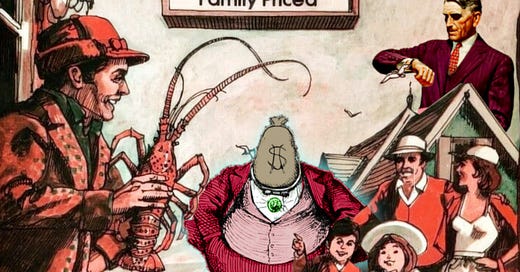Links for Friday, May 24
Notes about climate hope and the vultures around us. Plus some fun and a little music
Today’s hefty set of links offers several important thoughts: among them, climate hope vs. courage, and the sea of predators Americans are wonderfully blind to. Plus a musical treat.
Links
Our recent piece, “Collapse of the Thwaites Glacier Has Accelerated,” made a strong impression on a number of readers, so I thought I’d follow with thoughts related to this.
• ‘In the face of scary things, we need courage, not hope’ (Dr. Ella Gilbert)
Consider this 2023 video on the certain failure of the Western Antarctic glaciers, which serves, more importantly I think, as a reflection on courage and hope.
The scientist she interviews is Kaitlin Naughton. At 10:51 Naughton discusses the importance of courage as we deal with the loss of hope. This is from Naughton’s published piece on the subject (emphasis mine):
There are some consequences of climate change that can no longer be avoided, no matter how much fossil fuel use falls. …
How do you tell a bad news story? The conventional wisdom is that you’re supposed to give people hope: to say that there’s a disaster behind one door, but we can avoid it if only we choose a different one. What do you do when your science tells you that all doors lead to the same disaster?
Kate Marvel, an atmospheric scientist, said that when it comes to climate change, “we need courage, not hope … Courage is the resolve to do well without the assurance of a happy ending”.
My own reflection on how to shoulder this burden is here.
File under “Grownups do first what’s needed, not what feels good.”
• UK Banks Will Go Bust Because of Climate Change (Richard Murphy via Naked Capitalism)
When you borrow money from a bank, at least when you borrow a lot of money from a bank, the bank will normally want what they call security from you. In other words, they want some form of guarantee that you can repay.
Well, you don’t wholly blame them, do you? But let’s explain the most common form of security that they ask for. It’s your house, or if you’re a business, it’s your business property. In fact, 85 per cent of all loans made by UK banks are for the purchase of houses or business properties, or are at the very least secured on the value of houses and properties.
So why are banks going to go bust because of climate change? Well, because as a very senior risk officer of a very large UK bank explained to me not so very long ago, the vast majority of the properties that they are using for the purposes of security could be underwater in the next 30 years. [emphasis added]
Cambridge, for example, will be under water. And a whole lot more. He offers a list of places.
Pay attention to the time frame — before the mid-2050s. Many of us will still be alive.
File under “So much for the thirty-year loan.”
• The real reason Red Lobster went belly up (Cory Doctorow)
That's a pretty good model for understanding what's happened to Red Lobster: monopoly power and monopsony power begat more monopolies and monoposonies in the supply chain. Everything that hasn't consolidated is defenseless: diners, restaurant workers, fishermen, and the environment. We're all fucked.
Decent, no-frills family restaurant … are easy pickings for looters because the people who patronize them have little power in our society – and because those of us with more power are easily tricked into sneering at these places' failures as a kind of comeuppance that's all that's due to tacky joints that serve the working class.
Note his comment about “sneering.”
File under “‘Vulture capital,’ but what’s in a name?”




